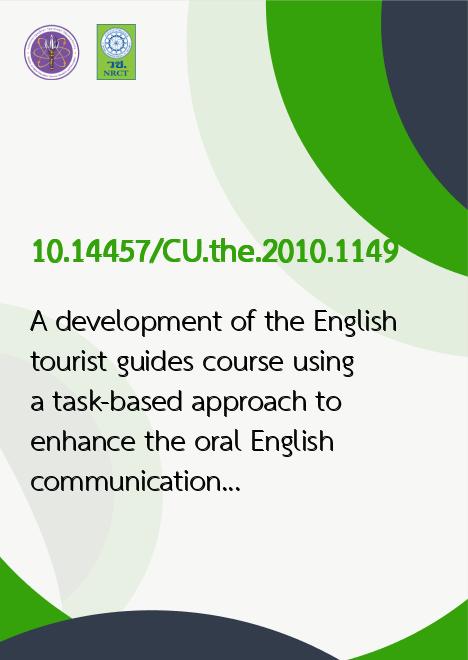
|
A development of the English tourist guides course using a task-based approach to enhance the oral English communication ability of Chiang Mai Rajabhat University undergraduates |
|---|---|
| รหัสดีโอไอ | |
| Title | A development of the English tourist guides course using a task-based approach to enhance the oral English communication ability of Chiang Mai Rajabhat University undergraduates |
| Creator | Nittaya Sanguanngarm |
| Contributor | Suphat Sukamolson, Boonsiri Anantasate |
| Publisher | Chulalongkorn University |
| Publication Year | 2553 |
| Keyword | Tour guides (Persons), Students, English language -- Study and teaching, Verbal ability, Oral communication, มัคคุเทศก์, นักศึกษา, ภาษาอังกฤษ -- การศึกษาและการสอน, ความสามารถทางภาษา, การสื่อทางภาษา |
| Abstract | This study was aimed at developing the English Tourist Guides course using a task-based approach for Chiang Mai Rajabhat University undergraduates. The course was developed based on needs analysis and related literature. The objectives of the study were to identify the components of the course and to evaluate its effectiveness in enhancing learners’ oral English communication ability and learning task engagement. The two main phases in this study are the course development and the course effectiveness. For the development phase, the needs analysis together with related literature were gathered, analyzed and synthesized. The instruments for needs analysis included a document study and semi-structured interviews with tourist guides, Chiang Mai Rajabhat University alumni and English teachers who usually teach the existing course. The course was developed accordingly, validated by 3 experts in the field, and piloted. To find the effectiveness of the course, the main study was conducted with 24 fourth-year Tourism major students studying at Chiang Mai Rajabhat University. Both quantitative and qualitative data were collected for the course evaluation. Instruments for quantitative analysis were an oral English communication ability test, a student engagement questionnaire (a self-checklist) and a student engagement observation checklist. Instruments for qualitative analysis included a student log, and the recording of the focus group’s dialogues. The quantitative data were analyzed by means of descriptive statistics and Paired-Samples t-tests using SPSS while the qualitative data were analyzed by Content Analysis using Hyper Research. It was found that the course content consisted of the task content of conducting a tour and launching a tour package, while the language content included relevant language and communication skills with listening and speaking skills as the focus. Moreover, taskbased language learning, together with authentic inputs, were the main means for learning. The results indicated that learners’ oral English communication ability improved significantly when p = 0.05 with a large effect-size. It was also found that learners’ learning task engagement was much higher than the average. Learners demonstrated active task engagement in their learning. Therefore, it is suggested that the developed course can serve the needs of the students learning English for tourism at Chiang Mai Rajabhat University and somewhere else with a similar context. |
| URL Website | cuir.car.chula.ac.th |